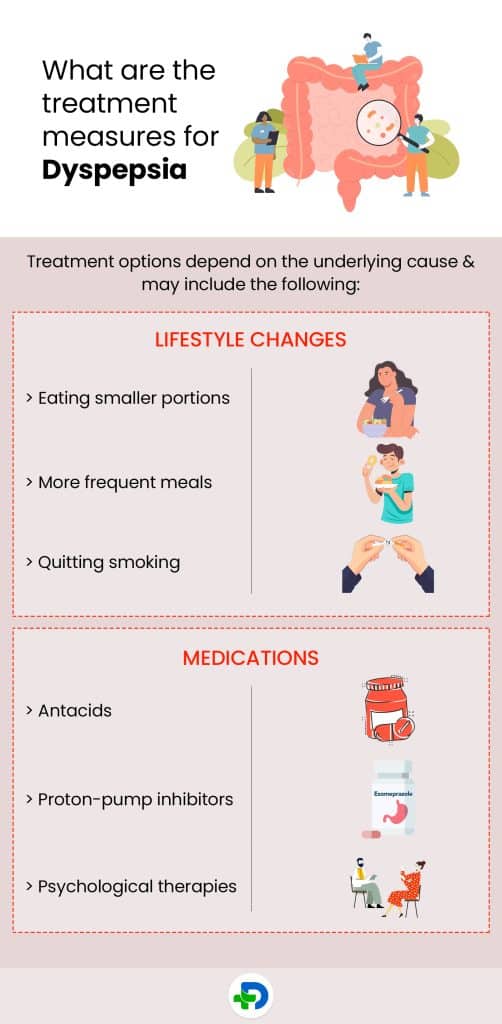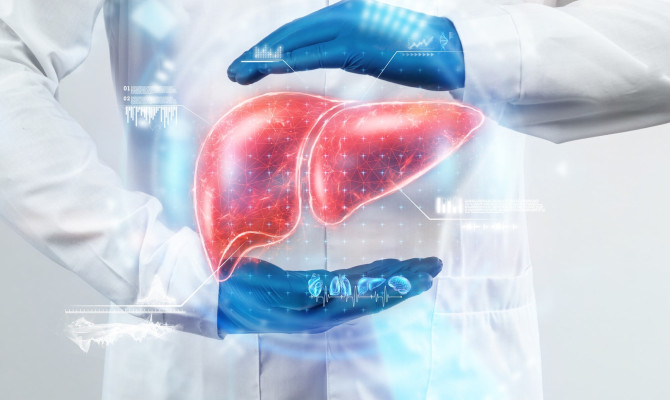Dyspepsia: Understanding and Management

- Dyspepsia
- 14 Aug 2023
Overview
What is Dyspepsia ?
Indigestion, or dyspepsia, is a common digestive condition that affects the upper digestive system.
Several symptoms, such as upper abdominal soreness or discomfort, characterise it. It is additionally known as dyspepsia. Indigestion can result from a variety of causes.

Causes
What are the causes?
Gastroesophageal reflux disease
- In this situation, the oesophagus becomes inflamed and irritated as stomach acid leaks back into it. 1What are the causes | Researched based study from Niddk.nih.org
Peptic ulcers
- These are open sores that develop in the stomach or duodenum (the first section of the small intestine), frequently due to Helicobacter pylori infection or chronic nonsteroidal anti-inflammatory medication use. (NSAIDs). 1What are the causes | Researched based study from Niddk.nih.org
Gallbladder disease
- This includes ailments that can cause pain and distress in the upper abdomen, such as gallstones or gallbladder inflammation. 1What are the causes | Researched based study from Niddk.nih.org
Lifestyle factors
- Stress, smoking, drinking alcohol, eating fatty or large meals, and dietary practices may contribute to dyspepsia symptoms.
- Pancreatitis, certain medications, infections, and certain kinds of cancer are some less frequent causes of indigestion. 1What are the causes | Researched based study from Niddk.nih.org
Types
What are the types?
Organic dyspepsia
- An underlying medical problem like gastroesophageal reflux disease, peptic ulcers, or gastritis brings it on. (GERD). Medical interventions can frequently be used to identify and treat organic dyspepsia.
Functional dyspepsia
- Indigestion symptoms characterize it without a medical reason. It can also be categorised as either epigastric pain syndrome or postprandial distress syndrome (PDS). (EPS). After-meal fullness and bloating are indicators of PDS, whereas upper abdominal pain or burning sensations are signs of EPS. 4What are the types | Researched based study from Nlm.nih.org
Symptoms
What are the symptoms?
The most typical signs and symptoms include
- Upper abdominal discomfort or pain
- After-meal bloating or feeling full
- Nausea or vomiting
- Gas or belching
- Burning pain or acid gas
- Decreased appetite
- Quickly feeling satisfied after eating.
- Unintentional loss of weight
These signs and symptoms may be minor or significant, recurring or chronic. If you have these symptoms frequently or are followed by other symptoms like blood in the vomit, trouble swallowing, or excruciating abdominal pain, you should see a doctor. 1What are the symptoms | Researched based study from Niddk.nih.org
Risk
What are the risk factors?
The chance of developing dyspepsia can be influenced by several factors, including:
- Poor diet-Large quantities of fatty or spicy foods, coffee, booze, and acidic drinks can irritate the stomach lining.
- Medications-Aspirin, ibuprofen, steroids and antibiotics are some examples of drugs that can lead to dyspepsia.
- Smoking-Weakens the muscles that regulate how food moves through the digestive system, increasing the risk of indigestion and other digestive issues.
- Stress-High amounts of stress can affect how much stomach acid is produced and slow the digestive process. 3What are the risk factors | Researched based study from Nlm.nih.org
- Underlying medical condition-The danger can be increased by taking specific medications for conditions like IBS, peptic ulcers, etc.
- The age and gender-More typical in women than in males, and it’s more likely to happen to older people. 1What are the risk factors | Researched based study from Nlm.nih.org
Diagnosis
How is dyspepsia diagnosed?
A comprehensive medical history, physical examination, and potentially some diagnostic tests are typically required to diagnose dyspepsia. Your doctor may ask about your symptoms, medical history, and lifestyle to better understand your situation. 2How is dyspepsia diagnosed| Researched based study from Nlm.nih.org
Your doctor may suggest one or more of the following tests in addition to the medical history and physical evaluation.
- Blood studies to look for anaemia or other medical issues that could be the source of your symptoms.
- Stool tests to look for infections or other digestive system abnormalities
- To search for structural issues, your digestive system may be imaged using imaging techniques like X-rays, ultrasounds, or CT scans.
- Endoscopy is a procedure that includes inserting a small, flexible tube with a camera into your digestive system to look for anomalies or collect tissue samples for additional testing. It can identify reflux esophagitis, inflammatory illnesses, and ulcers. 2How is dyspepsia diagnosed | Researched based study from Nlm.nih.org
Treatment

What are the treatment measures?
Treatment options depend on the underlying cause and may include the following:
Lifestyle changes
Making specific changes to your diet and lifestyle can help reduce dyspepsia symptoms. These include 2What are the treatment measures| Researched based study from Nlm.nih.org
- Eating smaller portions
- More frequent meals
- Avoiding spicy or fatty foods
- Quitting smoking
- Limiting alcohol and coffee consumption.
Medications
Depending on the underlying cause, medicines may be prescribed to relieve symptoms. Some of the common drugs include 2What are the treatment measures | Researched based study from Nlm.nih.org
- Antacids
- Proton-pump inhibitors (PPIs)
- Histamine H2-receptor antagonists.
- Metoclopramide for functional dyspepsia.
- Psychological therapies
- Stress and anxiety can worsen the condition. Cognitive Behavioural therapies (CBT) and other psychological therapies may be helpful.
Surgery
- Rarely, surgery may be required to address dyspepsia brought on by a structural issue like a hiatal hernia or digestive tract obstruction. 2What are the treatment measures | Researched based study from Nlm.nih.org
Complications
What are the complications?
It can result in complications if untreated or poorly handled, including
Gastroesophageal reflux disease
- Dyspepsia is a sign of GERD, in which the oesophagus becomes inflamed and irritated when stomach acid flows back into it. GERD problems such as esophagitis, Barrett’s oesophagus, and oesophagal cancer can develop over time.
Peptic ulcers
- Peptic ulcers, which are sores in the stomach or duodenum’s lining, maybe the reason. If untreated, peptic ulcers can result in problems like bleeding, perforation, and obstruction.
Gastric cancer
- It may occasionally be a sign of gastric cancer, a form of cancer that starts in the stomach walls. If it is aggressive and challenging to treat.
Malnutrition
- If chronic dyspepsia is not correctly managed, it can prevent the body from absorbing nutrients and result in malnutrition.
Prevention
What are the preventive factors?
Here are some recommendations for avoiding indigestion.
Avoid trigger foods
- Alcohol, caffeine, fatty or spicy meals, and other substances can all cause dyspepsia. Limit your intake of these or try to prevent them altogether. 5What are the preventive factors | Researched based study from Niddk.nih.org
Eat smaller, more frequent meals
- Consuming some smaller, more regular meals during the day. Eat wholly and slowly chew your food. Eat smaller, more frequent meals throughout the day rather than one big meal to avoid overeating. 5What are the preventive factors | Researched based study from Niddk.nih.org
Maintain a healthy weight
- Obesity can raise the risk by increasing the pressure on your stomach.
Regular exercise
- Exercise regularly can assist with digestion and dyspepsia prevention. Try to exercise for at least 30 minutes, most days of the week, with a moderate effort. 5What are the preventive factors | Researched based study from Niddk.nih.org
Manage stress
- Dyspepsia symptoms can be triggered by stress. Try relaxing activities like yoga, meditation, or deep breathing to handle stress. 5What are the preventive factors | Researched based study from Niddk.nih.org
Don’t smoke
- The stomach walls can become irritated from smoking.
Limit your alcohol intake
- Your stomach lining may become irritated by excessive booze use.
Discuss any drug concerns with your doctor
- Nonsteroidal anti-inflammatory drugs (NSAIDs), for example, can raise the chance. Discuss the medications you are taking with your doctor and any possible adverse effects. 5What are the preventive factors | Researched based study from Niddk.nih.org
Emergency
When should I make a doctor’s appointment?
If you experience any of the following symptoms, or if your dyspepsia symptoms are severe or chronic, you should contact your doctor immediately.
- Swallowing issues or chronic vomiting
- Unexplained loss of weight
- Severe or ongoing stomach discomfort
- Tarry or black stools
- Blood in the stool or vomiting
- Chest pain or breathlessness
- Reduced appetite
- Yellowing of the skin or eyes or pale complexion
Dyspepsia can have many causes and is not a severe disease. But most dyspepsia sufferers can relieve their symptoms and improve their quality of life with proper management and preventive steps.
Any feedback on this article?
 This Articles content was accurate
This Articles content was accurate Very Informative Article
Very Informative Article I have a question or a comment
I have a question or a comment
 This article contains inaccurate content
This article contains inaccurate content This article was not helpful
This article was not helpful I have a question or a comment
I have a question or a comment
We appreciate your helpful feedback!
Checkout our social pages
References
-
National Institute of Diabetes and Digestive and Kidney Diseases
Indigestion(Dyspepsia) | Symptoms | Causes
-
National Library of Medicine
Evaluation and management of dyspepsia | Diagnosis | Treatment
-
National Library of Medicine
Prevalence and Risk Factors of Functional Dyspepsia in Health Check-up Population: A Nationwide Multicenter Prospective Study | Riskfactor
-
National Library of Medicine
Dyspepsia: organic versus functional | Types
-
National Institute of Diabetes and Digestive and Kidney Diseases
Indigestion (Dyspepsia) | Treatment


































